When the Universal Declaration of Human Rights was being negotiated, one forward‐thinking Canadian included economic, social and cultural rights in the draft. Decades later, everyone’s right to a standard of living adequate for their health and well‐being still requires attention and action in Canada and around the world.
Freedom from want
Economic and social rights are human rights
By Leslie Vryenhoek
Published: December 6, 2024
Tags:
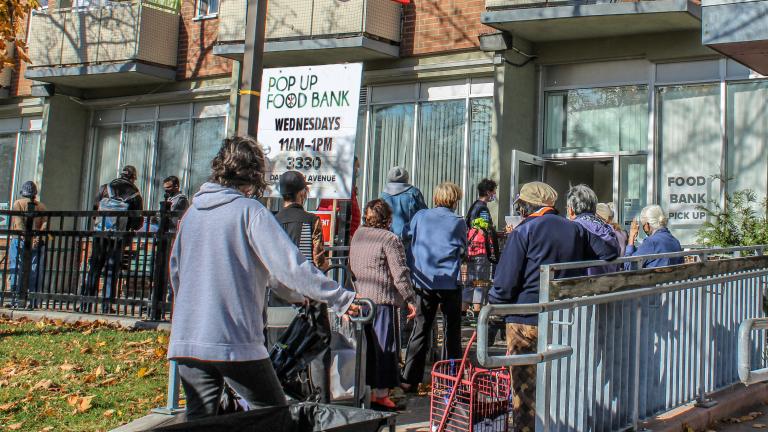
Photo: Mostofa Mohiuddin, Shutterstock
Story text
In October 2024, the Canadian Museum for Human Rights (CMHR) asked people in Canada, in our annual survey, what they considered the most important human rights issue in the world right now. While wars, extreme weather events and the deterioration of democracy dominate headlines, almost one in ten respondents cited income inequality, poverty and food security as their greatest global concern.
A similar open‐ended question asked respondents to name their greatest human rights concern in Canada. Again, economic and social issues like inequality, poverty, health care and housing came up over and over again.
It’s clear many Canadians understand these issues as fundamental human rights. And there’s no doubt that living without — without adequate food, clean drinking water, sanitation and shelter — imperils the safety and security of human beings, or that education and health care are integral to one’s ability to exercise their political and civil rights. Given the interconnected relationship between human dignity and economic and social factors, it seems unfathomable that these rights could have been omitted from the Universal Declaration of Human Rights (UDHR). Yet they may have been, had it not been for one Canadian.
The origins of our economic human rights
When the architects of the UDHR came together in 1947, the world was struggling to emerge from a very dark place. The Second World War had taken over 70 million lives, with 11 million lost to the horrors of the Holocaust. Countless others had been subjected to state brutality, property seizure and degradation. Members of the drafting committee were intent on ensuring individual rights, so that fascism could never again gain such a grip.
But it wasn’t only civil and political rights that had been devastated. The war had reduced cities to rubble. National economies were in ruins and citizens of once‐prosperous nations faced shortages of food and other essentials. Just a decade earlier, the Great Depression had also fueled destitution and upheaval.
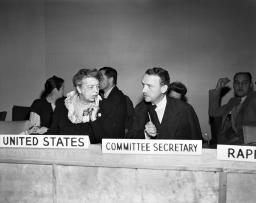
Amidst all that, it was clear that the economic and social rights of people would also need protection. Or at least, that’s how Canadian John Peters Humphrey saw it.
Humphrey came to his position as director of the Division of Human Rights at the United Nations (UN) with a keen interest in economic and social rights. Although orphaned young, he had grown up affluent enough to attend private schools and pursue higher education. He also had an inclination to place the common good above the benefit of the individual,[1] a tendency that solidified during the Depression, when he was working as a lawyer in Montreal.
Humphrey was asked to prepare a first draft.
“I suppose the most important decision that I took was the decision to include economic and social rights in the draft Declaration,” he told CBC radio host Peter Gzowski in a 1992 interview.[2]
You know, 1948, economic and social rights were considered as being pure socialism.
Despite resistance from some Western nations to include state obligations and numerous revisions of the draft, once Humphrey had written them in, they were there to stay. The UDHR adopted by the UN in 1948 contains several social, economic and cultural rights, beginning with Article 22:
Everyone, as a member of society, has the right to social security and is entitled to realization, through national effort and international co‐operation and in accordance with the organization and resources of each State, of the economic, social and cultural rights indispensable for his dignity and the free development of his personality.[3]
The next six rights detail: an adequate standard of living, the right to work and fair renumeration, education, maternity and childhood protections, social security, and the right to take part in culture.
While the UDHR is the foundation for all human rights as we understand them today, it is not legally binding. During the next two decades, Humphrey helped shepherd in two international treaties that put legal teeth to the UDHR: the International Covenant on Civil and Political Rights and the International Covenant on Economic, Social and Cultural Rights (CESCR).
The division between these two treaties was not meant to create a hierarchy of rights. It was a by‐product of the polarized ideologies that characterized the Cold War era, when it was common to create a false divide between political/civil rights from economic rights.[4] In other words, the rights contained in these treaties are of equal weight — at least in countries that have ratified both, as Canada did in 1976.
National obligations
Ratifying a treaty obligates a government to recognize the rights spelled out in it. For example, the CESCR gives people the right to adequate food, clothing and housing, along with safe drinking water. Governments with the means can, for example, support this through a wide range of funding programs to help low‐income families meet their nutrition and shelter needs, though poorer nations often rely on funds from other countries, institutions and non‐governmental organizations.
But many countries, including Canada, have mixed records. Poverty and inequality have risen everywhere, and we see the impact in our own communities.
Governments are most likely to step up and address economic hardship when a significant number of voters is impacted, as happened during the COVID‐19 pandemic. Lockdowns and restrictions left millions of Canadians without work. As in many countries, the federal government responded by offering cash transfers, the largest of which was the Canadian Emergency Response Benefit (CERB). CERB, along with other wage subsidies and business loans, moved cash quickly and prevented widespread deprivation.
Responses like this highlight the ability of governments to protect citizens’ rights. But these were only temporary measures, with limitations that meant some of the most vulnerable in Canada were left out. For example, those with earnings under $5,000 in the previous year, millions of gig workers and an estimated 1.8 million migrant workers did not benefit. In the years since the pandemic, high inflation and rising interest rates have pushed Canada’s poverty rate up after years of decline.[5] Today, one in ten Canadians are unable to access “a standard of living adequate for the health and well‐being” for themselves and their families.
The experience of widespread income supplements during the COVID‐19 pandemic reinvigorated a conversation about ongoing guaranteed minimum income supports. Travis Tomchuk has explored the impact of this in his story about Manitoba’s 1970s “Mincome” experiment.
However, an ongoing guaranteed income is not a reality in Canada today. What is a reality is increased food insecurity — Food Banks Canada reported a record‐breaking 2 million visits to Canada’s food banks in March 2024 — and growing tent encampments in parks and on river banks across the country.
Inequality
Poverty is a multifaceted problem, but at its root is inequality. Wealth and resources are distributed unevenly between countries. Within countries, relatively few tend to control a great proportion of the wealth and resources. A centuries’ long legacy of racism, discrimination and colonization have created deep‐rooted structural inequalities that continue to impact economic outcomes today.
While Canada is far from being one of the most unequal societies (that distinction goes to South Africa[6]), inequality is a major and growing issue here, too. In 2024, Statistics Canada reported that the richest 20 percent own over 65 percent of Canada’s wealth.[7]
In Canada, understanding inequality is as close as your tap. If you are like the vast majority of Canadians, turning that tap delivers safe water for drinking, cooking and brushing your teeth. But if you live in one of the First Nations communities in Canada that are under boil‐water advisories, your right to access clean water is not a given.
Not long ago, one of those communities was Shoal Lake #40.[8] Shoal Lake is the source of water in Winnipeg, including the CMHR. The people who live on its shores have cared for that water since time immemorial. However, the residents of Shoal Lake #40 were without clean drinking water for more than 25 years.
They were also, for a century, cut off from the mainland. Construction of the aqueduct to deliver water to Winnipeg cut the community apart. The village located on the mouth of Falcon River and Shoal Lake was forcibly relocated to a manmade island. To reach the mainland, residents had to rely on an old ferry in the warmer months — when it wasn’t broken down — or an ice road, which was only safe during hard freezes.[9]
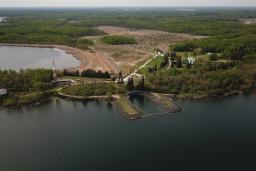
This situation occurred despite the agreements made in Treaty #3, signed by both Indigenous and Settler representatives in 1873, which purported to guide the respectful sharing of the land.
It took years of community activism and protests by First Nations (including one at the CMHR before it opened in 2014) and international interest before Canada, the Province of Manitoba and the City of Winnipeg agreed to fund construction of the “Freedom Road,” which links the community to the TransCanada Highway. The road opened in 2019. Then construction began on a new water treatment facility that finally came online in 2021, giving Shoal Lake #40 residents the same right that Winnipeggers had been enjoying at their taps for over a hundred years.
2021 is also the year Canada officially adopted the United Nations Declaration on the Rights of Indigenous Peoples Act. That international Declaration requires Canada to defend the dignity and well‐being of Indigenous people. As Karine Duhamel points out in her article on UNDRIP, “The lack of basic infrastructure and services — such as clean water — in many Indigenous communities flies in the face of a declaration that demands equal access, treatment, opportunity and well‐being.”
But in the area of safe drinking water, at least, there has been progress. Since 2015, thanks to ongoing advocacy from Indigenous communities and coordinated efforts by First Nations governments and the Canadian government, 147 boil water advisories have been lifted. But at the end of 2024, 29 communities are still without access to safe water.[10]
Individual and collective agency
The activism of Indigenous communities to continue to fight safe drinking water underlines a crucial component of securing economic and social rights. While national governments, with the support of the international community, bear the obligation to ensure all human rights are protected, it is often individual and collective efforts that bring about social justice.
One way they do this is by organizing to demand their rights. Often this takes the form of labour movements, which gained strength in the early twentieth century, exemplified by Winnipeg’s General Strike of 1919. Since then, trade unions have helped enhance job security, incomes and social protection by giving workers collective power.
Globally, membership in trade unions has waned as the nature of work changes and jobs increasingly become non‐standardized or informal. However, there remain places today where worker organizations are gaining strength, especially in Latin America and Africa.[11]
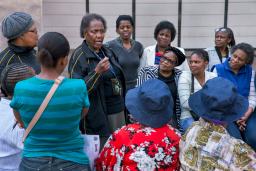
And it’s not just people in standard employment relationships who are fighting for decent working conditions and fair remuneration. Informal workers — people who typically have little or no social protection and do vital work yet earn little income[12] — have been organizing into associations, cooperatives and unions. These organizations are fighting for economic dignity for their members and winning battles locally, nationally and on the international stage. For example, domestic workers and homeworkers (sometimes called industrial outworkers) have both achieved international conventions at the International Labour Organization that detail decent working conditions for them.
An endlessly changing world
Consider what Humphrey achieved by crafting that first draft of the UDHR the way he did. Essentially, he established a standard of state‐supported social protections for individuals and families — things like pensions, disability payments, health insurance, unemployment insurance and other benefits.[13] Things that Canadians, like billions of people globally, take for granted every day.
And because they are human rights, they are universal.
They are not conferred by governments or by international treaties. They belong to every person at birth, regardless of the place or circumstances they are born into. Yet nearly eight decades later, over a billion people are without the standard of living needed to ensure their economic dignity.[14]
The World Bank has warned that progress on eliminating poverty has stalled following the COVID‐19 pandemic. New threats to economic dignity are constantly emerging. Extreme weather events will increasingly prevent people the world over from being able to meet their basic needs.[15] And as the drafters of the UDHR knew, among the many terrible things war is, it is a catalyst for economic indignity. Over 40 percent of the 1.1 billion people living in acute poverty live in areas rocked by conflict.
In our annual survey, many Canadians told us that socioeconomic issues were their biggest human rights concern in Canada and internationally. Now, it’s up to all of us to advocate for and work toward the protection of everyone’s social and economic rights.
Questions:
Do you think having economic and social rights in the UDHR has helped people live better lives?
What do you think are the main causes of poverty and inequality in the world today?
How do you think these rights can be advanced for all people?
Explore further

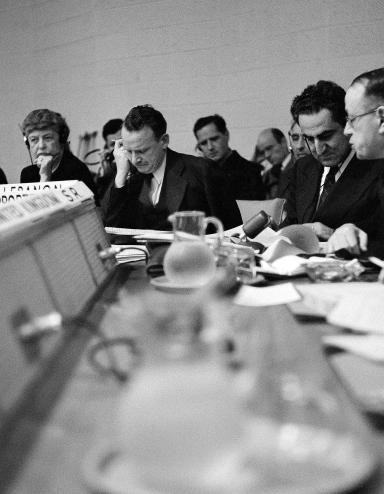
References
- Johannes Morsink, The Universal Declaration of Human Rights: Origins, Drafting and Intent, (1999), citing R. St. J. MacDonald, “Leadership in Law: John P. Humphrey and the Development of International Law and Human Rights,” The Canadian Yearbook of International Law 29 (1991). Back to citation 1
- The Walrus Lab, Canadian Time Machine podcast, “Canada’s surprising relationship to the Universal Declaration of Human Rights” February 29, 2024. Back to citation 2
- The UDHR, like most documents of the time, used masculine pronouns as the default. Article 1, however, clearly states that “All human beings are born equal in dignity and rights” thanks to the intervention of Hansa Mehta, the delegate from India and the only woman, aside from Eleanor Roosevelt, on the Drafting Committee. Back to citation 3
- George J. Andreopoulos, “Universal Declaration of Human Rights,” Encyclopedia Britannica, accessed November 19, 2024. Back to citation 4
- Statistics Canada, Canada's Official Poverty Dashboard of Indicators: Trends, April 2024 Back to citation 5
- Al Jazeera, “South Africa most unequal country in the world: Report,” March 10, 2022. Back to citation 6
- Statistics Canada, Distributions of household economic accounts for income, consumption, saving and wealth of Canadian households, second quarter 2024. Accessed November 29, 2024. Back to citation 7
- Shoallake40.ca, “Our History.” Accessed December 5, 2024. Back to citation 8
- Kyle Edwards, “We’ve been stranded on this island for the past 100 years,” Macleans, August 7, 2019. Back to citation 9
- Indigenous Services of Canada website, “Ending long‐term drinking water advisories,” accessed November 30, 2024. Back to citation 10
- International Labour Organization, Trade unions in transition: What will be their role in the future of work?, July 2021. Back to citation 11
- WIEGO, Understanding the Informal Economy, accessed December 4, 2024. Back to citation 12
- UN Human Rights Office of the Commissioner, Universal Declaration of Human Rights at 70: 30 Articles on 30 Articles — Article 22 citing the International Labour Organization (ILO). Back to citation 13
- Relief web, Global Multidimensional Poverty Index 2024 — Poverty and Conflict, October 17, 2024. Back to citation 14
- The World Bank, Pathways Out of the Polycrisis: Main Messages, accessed November 29, 2024. Back to citation 15
Suggested citation
Suggested citation : Leslie Vryenhoek. “Freedom from want.” Canadian Museum for Human Rights. Published December 6, 2024. https://humanrights.ca/story/freedom-want